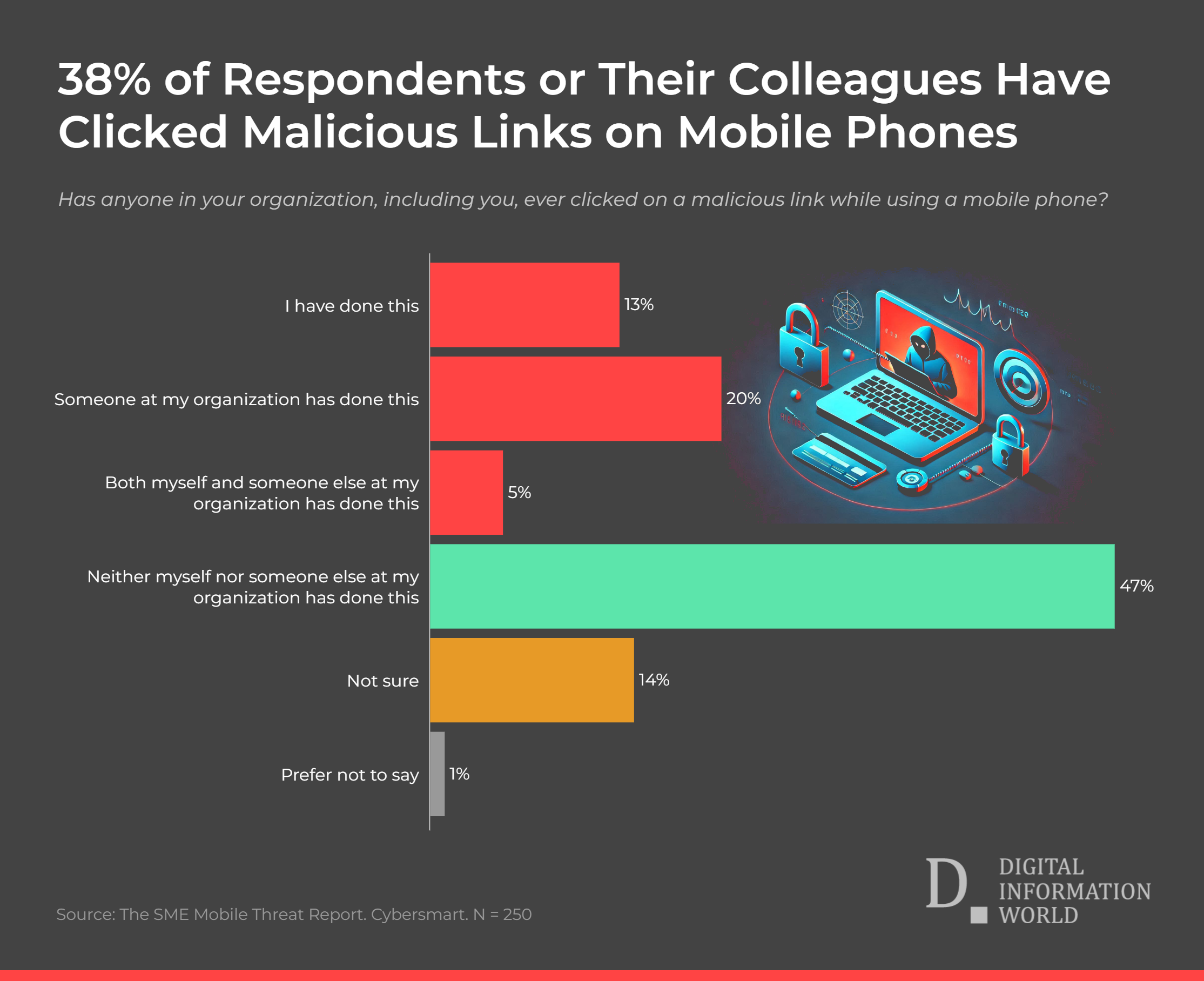As the technology is progressing, it is really hard to safeguard your devices from cybercrime attacks. A new research says that mobile phone users can fall victim to the $10.5 trillion per year cybercrime epidemic if they do not secure their devices.
A recent survey conduced by CyberSmart shows that 30% of the business owners and employees have fallen victim to phishing attacks after clicking on links that put their sensitive data in the hands of cybercriminals. 11% of the respondents of the survey also admitted that have left their passwords and other login details on their mobile phones without encryption. If users want to protect their data, they have to change the security measures on their mobile phones.
The survey of 250 small to medium business owners in the UK by CyberSmart revealed that 35% of small business employees have clicked on phishing attacks, while 30% got their data stolen due to those links. 9% of the small business employees also admitted that they have sent their corporate data to their personal account too. Most of the employees have little to no security awareness, and the cybersecurity industry needs to step up to change the perspectives of people about their mobile security. The first step is to admit that phishing is one of the biggest issues related to data theft, with new URLs bypassing existing intelligence and complicating the fight against cybersecurity threats.
Employees need to be trained to recognize phishing links, but it isn't as easy it seems. Phishing links have improved their link structure and grammatical errors, and they are now targeting mobile users through SMS. Most phishing attacks occur on mobile devices, and no company is able to protect their users 100% of the time from these attacks. Google has blocked a lot of ads that were thought to be of phishing attacks in 2023, with over 200 million ads being removed. Many users are fond of online shopping but they do not know that they are leaving a lot of their data behind for scammers.
Phishing attacks are constantly evolving and creating different campaigns that can help them attack as many victims as possible. Users should take a step forward to improve their security and trust no one when it comes to their mobile phones. Do not click on any link without fully verifying that it’s from an authentic source and researching it, especially those that encourage urgency.
Read next:
• OpenAI’s o1 Model Shows Genius Intelligence But Raises Major Ethical Questions
• Social Media Users Urged to Guard Against AI-Generated Fake Media
A recent survey conduced by CyberSmart shows that 30% of the business owners and employees have fallen victim to phishing attacks after clicking on links that put their sensitive data in the hands of cybercriminals. 11% of the respondents of the survey also admitted that have left their passwords and other login details on their mobile phones without encryption. If users want to protect their data, they have to change the security measures on their mobile phones.
The survey of 250 small to medium business owners in the UK by CyberSmart revealed that 35% of small business employees have clicked on phishing attacks, while 30% got their data stolen due to those links. 9% of the small business employees also admitted that they have sent their corporate data to their personal account too. Most of the employees have little to no security awareness, and the cybersecurity industry needs to step up to change the perspectives of people about their mobile security. The first step is to admit that phishing is one of the biggest issues related to data theft, with new URLs bypassing existing intelligence and complicating the fight against cybersecurity threats.
Employees need to be trained to recognize phishing links, but it isn't as easy it seems. Phishing links have improved their link structure and grammatical errors, and they are now targeting mobile users through SMS. Most phishing attacks occur on mobile devices, and no company is able to protect their users 100% of the time from these attacks. Google has blocked a lot of ads that were thought to be of phishing attacks in 2023, with over 200 million ads being removed. Many users are fond of online shopping but they do not know that they are leaving a lot of their data behind for scammers.
Phishing attacks are constantly evolving and creating different campaigns that can help them attack as many victims as possible. Users should take a step forward to improve their security and trust no one when it comes to their mobile phones. Do not click on any link without fully verifying that it’s from an authentic source and researching it, especially those that encourage urgency.
Read next:
• OpenAI’s o1 Model Shows Genius Intelligence But Raises Major Ethical Questions
• Social Media Users Urged to Guard Against AI-Generated Fake Media

